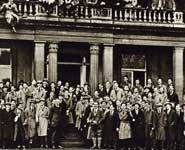The Festival brings together some of the country’s leading national policy figures and is an opportunity to hear from and debate with the leading minds in the field of education who will be sharing developments in areas from neuroscience to pervasive technologies through a series of exhibitions, debates, seminars and workshops.
Sessions will cover a range of topics from the brain and education, league tables, education reforms, the future of teacher education to sustainability, school governance and robots. A specially commissioned film reflecting on the history of education at Bristol using never-been-shown material from its archives will also be premiered.
Keri Facer, Festival Chair and Professor of Education & Social Futures at the Graduate School of Education, said: “The Centenary Festival promises to be an exciting and inspiring day of doing and debating. The day will look back at the last 100 years of teacher education in Bristol and forward to the possible global futures for education.
“The event will provide new ways to learn, teach and support education in the changing contexts of the 21st century.”
Talks include, Professor Andrew Pollard, who has recently been involved in Michael Gove’s curriculum reform, Professor Harvey Goldstein, a leading thinker on the use of data in education and Professor Patricia Broadfoot, Chair of the ESRC’s Understanding Society Programme, who will be debating on the role of politics, research and guesswork in shaping the future of education.
Professor Harvey Goldstein and Dr George Leckie will explore one of the areas in which technology has a large impact in education: league tables. ‘Understanding School League Tables: current practice, limitations and ways forward?’ will consider the ways in which schools are being held accountable through the performance of their students. The use of league tables will be illustrated together with an explanation of basic concepts.
Dr Chris Speed from the University of Edinburgh will introduce his innovative work with designer Larissa Pschetz in ‘Robots, Art and Time’ which explores children's conceptions of time using interactive interventions including robots and clocks that print the time.
‘Continual Reinspiration: writing, poetry, voice and creativity – making space in the curriculum’ brings together two of Bristol’s current teacher educators who have a specialist interest in creativity - Dr Alf Coles (Mathematics) and Lorna Smith (English) - with poet Rhian Edwards, to explore how to make space for inspiration and emergence in education.
A series of workshops run by sculptor and artist Pete Moorhouse showcasing woodwork, placing and arranging skills by children from St Werburgh’s Park Nursery School and Children’s Centre will start at 10.30 am and 12 noon.
The event is being hosted at the University’s Graduate School of Education, 35 Berkeley Square on Friday 28 June from 9.30am to 4.30pm. For further information or to book a place at the Festival please visit the event’s website. Please note advance booking is necessary to register a place.
100 years of teacher education at the University of Bristol timeline
1913 Senate instigated the creation of a single Teachers Training Board at the University
1920 Professor Helen Wodehouse becomes the first female Professor in the University
1921 Wodehouse pioneers the use of continuous assessment on the Diploma of Education
1947 Bristol Institute of Education is formed at the University – creating a hub for teacher education providers in the West of England
1950s High-quality initial teacher education, further professional studies, higher degrees and research attracts international and regional students
1960s Bristol supports through research and teaching the development of comprehensive education
1970s Bristol pioneers analyses of professionalism and school organisation
1980s Bristol develops comparative education and international partnerships
1990s The first doctorate in Education in the UK is established at the Graduate School of Education
2000s Initial teacher education at Bristol is consistently rated by Ofsted as “Excellent”
